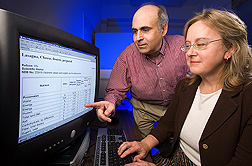This page has been archived and is being provided for reference purposes only. The page is no longer being updated, and therefore, links on the page may be invalid.
|
Read the magazine story to find out more. |
|
|
|
|
Nutritional "Report Cards" Rely on USDA Data
By Rosalie Marion BlissAugust 24, 2007
Across the country each day, dietitians interview clients one-on-one and record every food and beverage the client consumed over a given time period. With the push of a button, these dietitians are able to provide their clients with a nutritional "report card" and also to plan healthful dietary adjustments. Commercially available software programs that provide such custom-made printouts are driven by data developed by the Agricultural Research Service's (ARS) Nutrient Data Laboratory (NDL), Beltsville, Md.
The NDL is one of six laboratories at the ARS Beltsville Human Nutrition Research Center. ARS is the U.S. Department of Agriculture's chief scientific research agency.
So how do dietitians calculate the amounts of nutrients people get, based on a list of foods and drinks they report as having consumed? NDL researchers develop specialized databases--available free to consumers and professionals--that provide quality data on the content of calories, protein, fat, carbohydrates, vitamins and minerals in both single- and multi-ingredient foods. When these data are subsequently uploaded into any of a variety of software packages, the programs are able to estimate the amounts of a wide variety of nutrients consumed.
At the heart of projects to determine a suite of calories and nutrients in U.S. foods is the National Food and Nutrient Analysis Program. This year marks the 10th anniversary of a partnership in which NDL researchers work with other research groups within the Bethesda, Md.-based National Institutes of Health. Through these collaborations, food-nutrient data are generated and updated on a regular basis.
Nutrient data derived by NDL researchers also serve as the basis for USDA's MyPyramid Tracker, a highly interactive, free Internet service that provides a customized nutritional "audit" to individuals who report the foods and beverages they've consumed on a given day. The data are also used for a variety of studies, assessments and surveys, according to nutritionists David Haytowitz and Pamela Pehrsson, who oversee the analysis program at the Nutrient Data Laboratory.
Read more in the August issue of Agricultural Research magazine.

